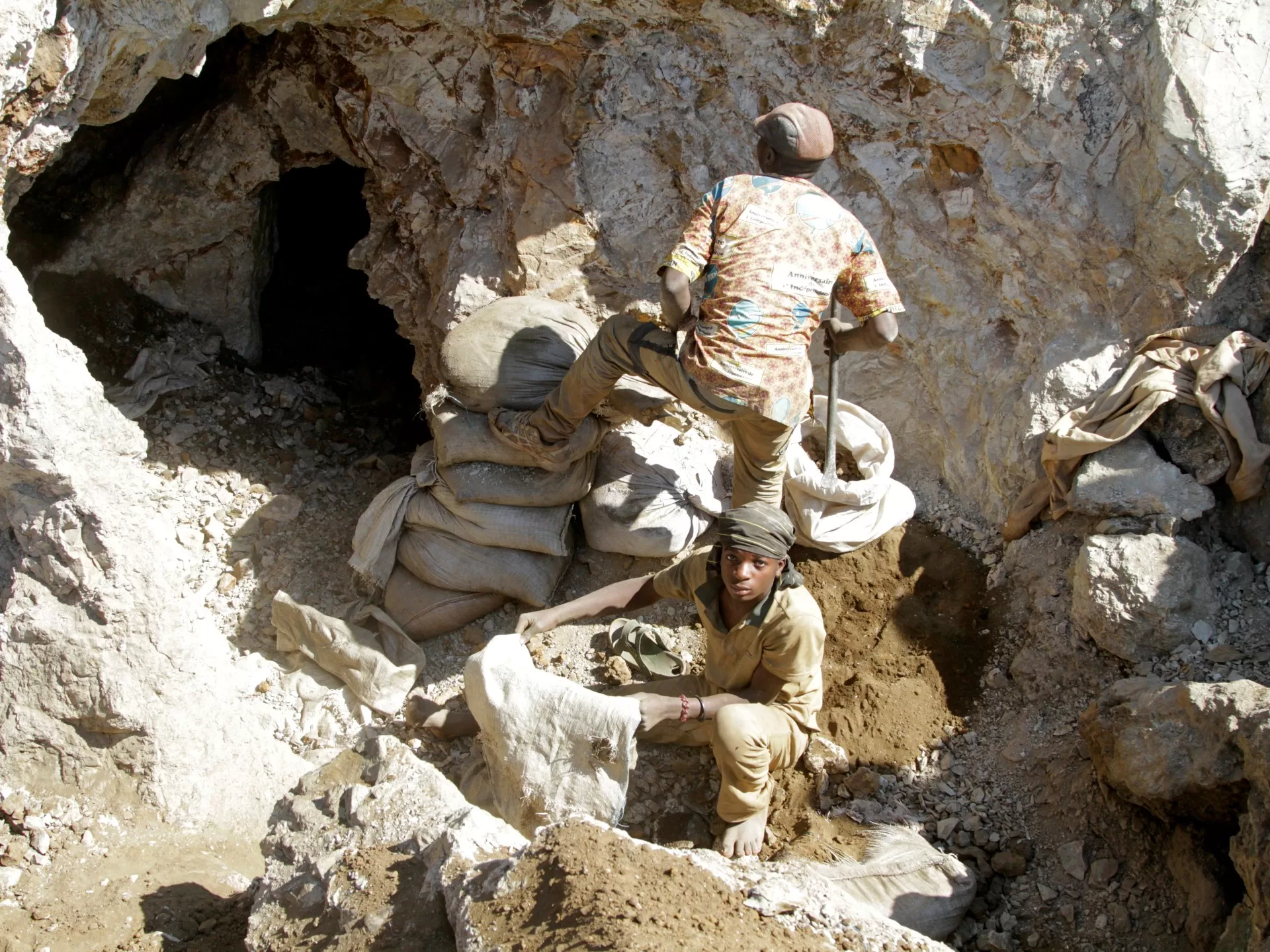When Clarissa Mwanza spoke to me of her work mining zinc in central Zambia, she looked anxious. Her husband, working alongside her, nearly died last year during a mining accident. He injured his leg when the ground caved in and spent a month in the hospital. Other miners buried up to their necks were seriously injured too.
Mwanza told me she also worries about her seven-year-old daughter, who sometimes joins her at the mine, packing rocks into sacks. The girl was diagnosed with lead poisoning last year, most likely from the toxic, lead-contaminated ground at the mine. Mwanza continues zinc mining despite her fears. She has no other options.
Zinc is a key metal used for constructing wind turbines and, therefore, necessary for the world’s urgently needed phase-out of fossil fuels and transition to zero-carbon renewable energy systems. The demand for zinc and other minerals needed for renewable energy – such as lithium, cobalt, manganese and nickel – is projected to rise sharply in the coming years. Securing so-called critical minerals has become a policy priority for industrialised countries and has prompted a new kind of bilateral and multilateral diplomacy around minerals, such as the Mineral Security Partnership.
In April, United Nations Secretary-General Antonio Guterres gave a moving speech about the role of minerals in the energy transition, urging world leaders: “As we reshape how we power our societies and economies, we cannot replace one dirty, exploitative, extractive industry with another dirty, exploitative, extractive industry. The race to net zero cannot trample over the poor.”
Yet there is a high risk that this is exactly what will happen. Human Rights Watch has documented a wide range of human rights violations in mining, including the use of child labour, chemical pollution threatening health, water scarcity and police violence.
The extraction and processing of transition minerals in particular is also characterised by abuses. Children do hazardous work in cobalt mining; Indigenous people’s rights have been violated for lithium mining; workers in manganese processing suffer manganese-related illnesses; and communities face severe pollution from nickel mining and smelting.
Such violations of international human rights law undermine the UN Sustainable Development Goals, including Goal 3 on health, Goal 6 on water access and Goal 8 on decent work. They also play into the hands of those opposing the energy transition.
Guterres’s speech inaugurated a new UN body, the Panel on Critical Energy Transition Minerals, which consists of governments, international agencies, industry groups and a few international nongovernmental organisations. Its task is to develop “principles to safeguard environmental and social standards and embed justice in the energy transition”.
Guterres’s initiative comes at a crucial moment as many governments have committed to transitioning away from fossil fuels. The UN panel has a unique opportunity to help define lessons learned from the past and spell out what transformative change towards a decarbonised future could look like.
But for this to happen, governments and industry need to understand past problems and recognise the harm mining has caused local communities. Currently, there are efforts to present mining as contributing to the Sustainable Development Goals and to encourage its recognition as an “essential ingredient” in the Sustainable Development Goals.
Instead of ignoring the risks, the panel should listen to civil society and community voices, push for the industry to uphold key principles and ensure that the urgently needed phase-out of fossil fuels and energy transition is just, equitable and transformative.
It should make international human rights and environmental standards the absolute baseline and make clear that they must be adhered to.
The panel should also urge governments and companies to ensure genuine participation of communities, civil society groups and trade unions in critical mineral decision-making and diplomacy.
There also needs to be greater transparency, including disclosure of critical mineral memorandums of understanding between governments, of mining revenues and of actors in supply chains. The panel itself should disclose who funds its work, who makes the decisions and who are the drafters of the outcome document.
The panel should spell out what wider policy and legal reforms are needed to ensure that minerals extraction generates tangible benefits for local communities and contributes to significant improvements in economic and social rights in producer countries. It should push for progressive tax and fiscal policies and recommend reform of international investment and trade frameworks – such as ending the use of secret investment arbitration – that interfere with human rights and environmental obligations of governments.
The panel should also advance policies that will reduce the overall amount of new mining. Such policies should require recycling and reuse to improve “circular” economy solutions and reduce energy use by high emission actors, including by expanding public transit and improving energy efficiency, with a view to enabling equitable, efficient and sufficient energy for all.
Finally, the panel should suggest avenues for redress when communities find their rights are being violated by mining. The UN system does not currently have a body monitoring and investigating rights violations in mining systematically.
The secretary-general and other senior UN officials should consult with civil society groups on options for a credible international body that would monitor and investigate human rights abuses occurring in the context of mining for the energy transition.
A rapid fossil fuel phase-out and just transition are needed, and there is no justification for delay. The UN panel should help bring it about by recognising and addressing the serious harm mining has caused and spell out what a truly just transition can look like.
The views expressed in this article are the author’s own and do not necessarily reflect Al Jazeera’s editorial stance.
